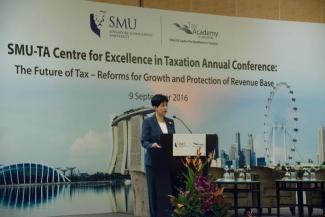
- Second annual conference is themed “The Future of Tax – Reforms for Growth and Protection of Revenue Base”
- Unique forum discussing tax policies and trends with focus on Asia
- Renowned thought leaders and researchers presented analyses and findings
What might the future of tax be? The Second SMU-TA Centre for Excellence in Taxation (CET) Annual Conference delved into insights about latest developments and issues of international taxation on 9 September at the Marina Bay Sands Expo and Convention in Singapore.
Over 150 participants from the region heard from Guest-of-Honour (GOH) Ms Indranee Rajah, Singapore’s Senior Minister of State for Law and Finance, as well as speakers comprising government, industry and research experts.
Designed to be a unique forum for tax practitioners, policymakers and academics to discuss key issues on international tax policies and trends with a particular focus on Asia, the conference this year was themed “The Future of Tax – Reforms for Growth and Protection of Revenue Base”.
In her opening address at the conference, Ms Indranee said that in the current weak economic climate, governments around the world are faced with pressure to raise revenue to meet various economic and social spending priorities. International tax policies play an important role in facilitating innovation-driven and inclusive growth.
“Singapore will continue to be plugged in to shape international tax rules… we should work together to counter tax avoidance through a robust multilateral rule-based system like the inclusive framework, instead of imposing unilateral measures.” She added that Singapore will continue to work in close partnership with the local businesses and the international community to formulate tax policies that are competitive, fiscally sustainable, progressive, and are able to attract and retain substantive business activities.
The conference looked into pertinent issues and latest developments in international taxation. With the slowing of the global economy, competition for investments will continue as governments look for ways to stimulate their economies. There are also challenges posed by global changes in international tax rules, tax evasion and avoidance, and complex cross-border issues.
The line-up of distinguished speakers and panellists sharing their views included:
- Prof Dr Jeffrey Owens, Director of WU Global Tax Policy Center, Institute for Austrian and International Tax Law, WU (Vienna University of Economics and Business), and Chairman of SMU-TA CET Technical Advisory Panel;
- Prof David Rosembloom, Director of International Tax Program, School of Law, New York University;
- Prof Philip Baker QC, Visiting Professor, Tax Law, Oxford University, and Barrister and Queen’s Counsel, Field Court Tax Chambers;
- Prof Dr Alfred Storck, Managing Director, WU Transfer Pricing Center at the Institute for Austrian and International Tax Law at Vienna University of Economics and Business (WU);
- Dr Raffaele Petruzzi, Managing Director, WU Transfer Pricing Center at the Institute for Austrian and International Tax Law at Vienna University of Economics and Business (WU) and Transfer Pricing Advisor, Deloitte (Vienna, Austria);
- Mr Yuri Araki, Deputy Director, International Operations Division National Tax Agency, Japan; and
- Prof Dr John Hutagaol, Director of International Taxation, Directorate-General of Taxes, Ministry of Finance of the Republic of Indonesia.
The experts and Centre’s researchers discussed and shared views on the reform of tax systems, the inter-relation between governments and businesses, the impact and challenges of BEPS’ implementation, as well as tax treaties and transfer pricing developments in the region.

[Photo: SMU-TA CET Director and SMU Associate Professor of Accounting Goh Beng Wee at the welcome remarks.]
SMU-TA CET Director and SMU Associate Professor of Accounting Goh Beng Wee remarked that although taxes have been around for decades, its role has evolved significantly over time. Apart from financing government expenditure, taxes are also tools to encourage economic growth and innovation. Given the many roles of taxes and the differences in how countries rely on tax policies, discussions are abound whenever new tax changes are brought up for feedback, introduced or implemented. There are many angles and perspectives from which tax issues can and should be considered and debated.
He said, “This, in my view, is what makes tax research exciting. I hope through robust and good quality discussions and research, the SMU-TA CET will contribute to continuous improvement to the tax environment.”
The SMU-TA CET is the first tax research centre in Singapore and is jointly set up by SMU School of Accountancy and the Tax Academy of Singapore. It undertakes policy-relevant, practice-oriented research and provides thought leadership in international tax with a particular focus on Asian economies and tax systems.

[Photo: Guest-of-Honour Ms Indranee meeting guests at the conference.]
[Featured Photo: Singapore’s Senior Minister of State for Law and Finance Ms Indranee Rajah delivering the opening speech at the conference.]
For more information, please visit: https://accountancy.smu.edu.sg/cet/
GOH Speech by Ms Indranee Rajah, Singapore’s Senior Minister of State for Law and Finance